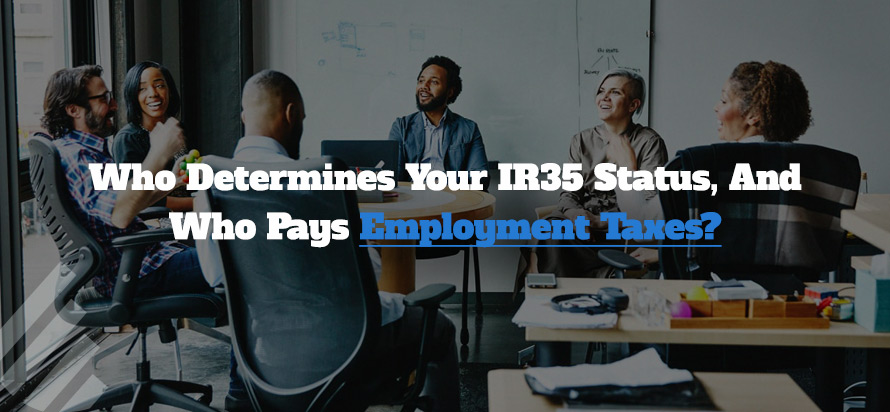
Who Determines Your IR35 Status, And Who Pays Employment Taxes?
When you have a business in the UK, you need to file for IR35. As a freelancer, contractor, and small business, you need to be familiar with the IR35 and its status.
The IR35 (Inland Revenue) reforms will significantly impact businesses across different sectors. The responsibility depends on PDC for determining the status of IR35. The client needs to understand if the workers are within the rules.
What is IR35 Legislation?
IR35 Legislation had become synonymous with off-payroll working for HMRC (Her Majesty’s Revenue and Customs). It was a part of the Finance Act and is referred to as IR35. Businesses of all sizes need to follow the IR35 Legislation.
In many cases, the IR35 Legislation will also be referred to as Intermediaries Legislation as it revolves around the employer hiring any third party for a particular work. This is introduced to ensure no 'hidden' employees in the organisation. However, the tax difference can have a significant impact on the losses.
With the help of IR35, the government wants to ensure that the workers, even if they are third-party, are considered employees. They should have a direct contract for the business and must pay for the Income Tax and National Insurance contribution as the employees.

How does it affect the business?
According to the government, the businesses must comply with the off-payroll working rules. In this kind of work, there are usually three parties involved. Some of the parties involved in this kind of business work include:
- Worker- This is the person who is responsible for providing the service. In many cases, they may also be referred to as freelancers, contractors, or off-payroll workers.
- Client- This is the one who provides work. They may either give the work directly or via an intermediary. In many cases, the client will also be referred to as end clients.
- Employment intermediary- This is the third-party responsible for providing a particular work to the worker. It may be a limited liability partnership, personal service company (PSC), limited company, and agency.
The third-party is responsible for providing the work, whereas the worker needs to get the job done. Furthermore, the intermediary is responsible for making the payment.
Small Business Exemptions to the new IR35 rules
Today there have been significant changes in the IR35 Rules. These rules are applicable for medium and large-sized businesses, and they may either belong to the private sector or of the private sector.
There may be exemptions for the clients so that the following criteria:
- No more than 50 employees.
- Balance sheet turnover of £5.1 million.
- Annual turnover that does not have over £10.2 million.
If the end client meets the two criteria, they will be eligible to apply for the IR35 status. This may, however, be considered legitimate for PSC or limited companies. Furthermore, they should work on determining the Status Determination Status.
How is the status of IR35 determined?
When determining IR35 status, there are several factors to consider. If operating outside the IR35, you need to understand the procedure. This can vary significantly, depending on contract to contract. The HMRC is responsible for determining the IR35 form status.
Here are some of the common factors that HMRC will consider while determining the status of IR35.
Working practices
The two most prominent working practices include self-employed entities and employees. The working practices you follow must reflect that of your business relationship.
However, some of the common practices that you need to follow for determining the business setup:
- Non-exclusivity.
- Provision of personal insurance.
- Lack of the employee benefits.
- Plannings to become self-employed.
- You are ready to accept a certain amount of business risk.
Financial Risk
Financial risk is an essential factor to consider while determining the use of IR35. When you provide fixed-price quotations, you will be able to control the risk. Furthermore, it would help if you took the liability of bringing any changes or removing errors without adding any additional charge.
The type of contract
The type of contract will vary whether you need it for a service or services. The contract refers to a legally binding document that helps to define the relationship between you and your client clearly. In the contract, you will need to specify the type of services you are offering and the charges.
The contract should clearly define everything that you and your client follow. A strong relationship of the same will contribute to determining the business's success. Some of the common core factors that need to be covered in the IR35 form include:
- Substitution.
- Control.
- Right of dismissal.
- Mutuality of obligations.
Employee benefits
The worker may provide a wide range of employee benefits. Therefore, it is advisable to avoid any benefits that you receive. Some of the common employee benefits that you must prevent are business cards, VAT, contractors, etc.
Furthermore, there should be comprehensive information surrounding the payment terms and remuneration. You should provide all the details in the contract.
Intention of parties
It is crucial to mention the parties and what the intentions are. As a contractor or service provider, you must provide all the necessary services to the client. However, it can become quite difficult if you fail to perform the necessary duties.
When you are performing a business, you must set professional boundaries, which should be by the IR35 guidelines set by the HMRC.
Equipment
When you need to provide your equipment for completing the project, you need to ensure the basics. It is advisable to consider the basics while starting the business. Furthermore, you should also understand if there is any additional revenue for the business.
If you need to provide any equipment to the service, such as laptops or software, you need to reach out to professionals. Furthermore, you must maintain about the same in an entity.
Conclusion
To comply with IR35, you need to provide the most appropriate services. Things become more manageable when you get everything in the same place. It is necessary to follow due diligence so you will be eligible for legal responsibilities. You can bring changes moving forward based on your needs.

Get in Touch
Get the best advice on tax savings, accounting services, payroll, self assessment, VAT and more, whether you want to call us directly, request a call back or chat online with our experts, rest assured that we will always give you the best advice.If you have any questions, or would like to speak to us in person, please do get in touch. We're here to help.
Head Office:
dns accountants
DNS House, 382 Kenton Road,
Harrow, Middlesex, HA3 8DP
Contact Number:
Email:
Other Offices:
- Barking Accountants
- Basildon Accountants
- Bournemouth Accountants
- Brighton Accountants
- Chancery Lane Accountants
- Guildford Accountants
- Harrow Accountants
- Haslemere Accountants
- London Accountants
- Maidstone Accountants
- Melksham Accountants
- Milton Keynes Accountants
- Nottingham Accountants
- Wales Accountants
- Warwick Accountants
- Wigan Accountants


Here’s what our clients say
“Been with dns Accountants for more than a year I would highly recommened their services. My account manager Sneha has been very helpful and helped with accounts and queries swiftly always! Having a good accountant means you can fully focus on your business, not worry about accounts and tax matters. Thank you dns :-)”


Here’s what our clients say
“I have been extremely satisfied with the service I have been receiving close to past 1 year. Very professional, transparent and helpful. Special mention of my Account Manager Minakshi Arora who made my transition very smooth and always ready to go that extra mile to support and make customer happy. Definitely recommended.”


Here’s what our clients say
“I've recently set up a Ltd. Company and signed up with dns for my accounting services. I've found it very good value for money and hugely helpful in terms of advice and guidance. I have a named Account Manager, Sneha Gurudutta, who keeps in contact with me and offers advice on line and on the phone... I'm really pleased with the service.”


Here’s what our clients say
“I recently started my own company and in need of a good accountant. With my friends reference, I started dns accountancy services and I am a quite satisfied with their service. My account manager Sneha Gurudutta was always responsive and guided me a lot especially during my company early days. Keep u the good work.”


Here’s what our clients say
“I have been dns for the last 3 months and I am very happy with the service. My account manager Sneha Gurudutta guided me and helped me with all the major/minor steps with the account setup. The weekend support they provide is really helpful. I would definitely recommend dns to all my friends.”


Here’s what our clients say
“Unfortunately my son passed away without leaving any contact name of his accountant. I was able to make contact with the firm through HMRC. The staff were very prompt, caring and supportive in settling his income tax account. I was extremely impressed with the efficient caring and supportive service received from all of dns staff.”


Here’s what our clients say
“Been with dns Accountants for more than a year I would highly recommened their services. My account manager Sneha has been very helpful and helped with accounts and queries swiftly always! Having a good accountant means you can fully focus on your business, not worry about accounts and tax matters. Thank you dns :-)”


Here’s what our clients say
“I have been extremely satisfied with the service I have been receiving close to past 1 year. Very professional, transparent and helpful. Special mention of my Account Manager Minakshi Arora who made my transition very smooth and always ready to go that extra mile to support and make customer happy. Definitely recommended.”


Here’s what our clients say
“I've recently set up a Ltd. Company and signed up with dns for my accounting services. I've found it very good value for money and hugely helpful in terms of advice and guidance. I have a named Account Manager, Sneha Gurudutta, who keeps in contact with me and offers advice on line and on the phone... I'm really pleased with the service.”


Here’s what our clients say
“I recently started my own company and in need of a good accountant. With my friends reference, I started dns accountancy services and I am a quite satisfied with their service. My account manager Sneha Gurudutta was always responsive and guided me a lot especially during my company early days. Keep u the good work.”


Here’s what our clients say
“I have been dns for the last 3 months and I am very happy with the service. My account manager Sneha Gurudutta guided me and helped me with all the major/minor steps with the account setup. The weekend support they provide is really helpful. I would definitely recommend dns to all my friends.”


Here’s what our clients say
“Unfortunately my son passed away without leaving any contact name of his accountant. I was able to make contact with the firm through HMRC. The staff were very prompt, caring and supportive in settling his income tax account. I was extremely impressed with the efficient caring and supportive service received from all of dns staff.”
















